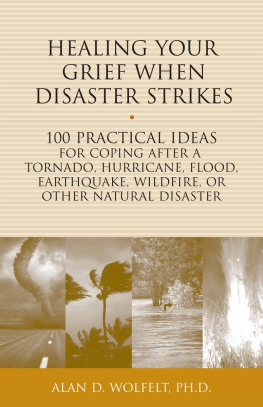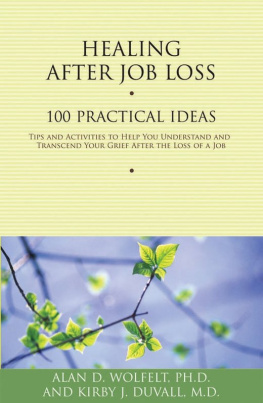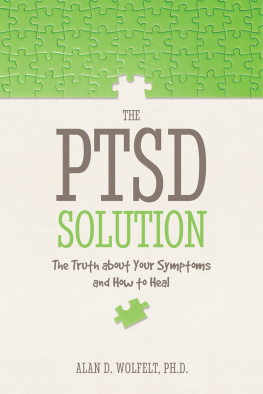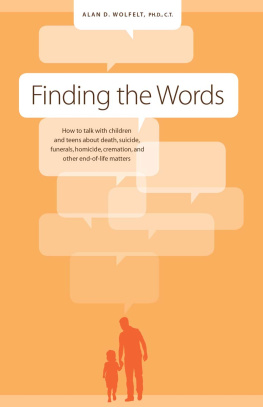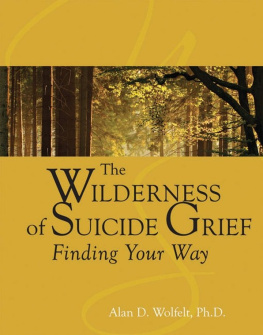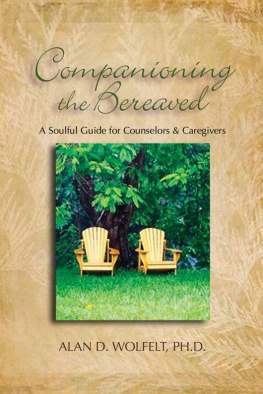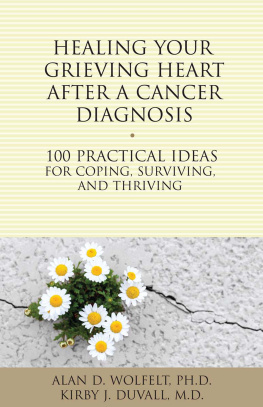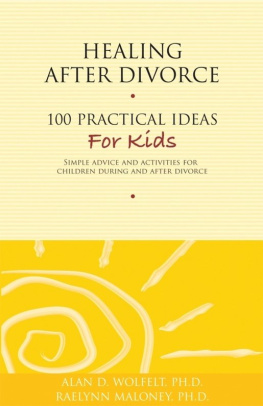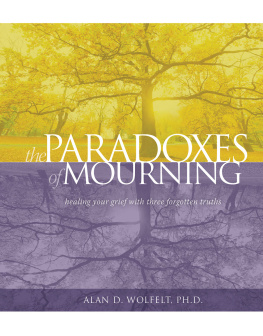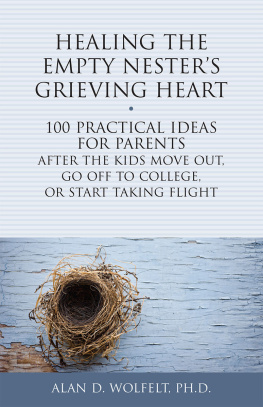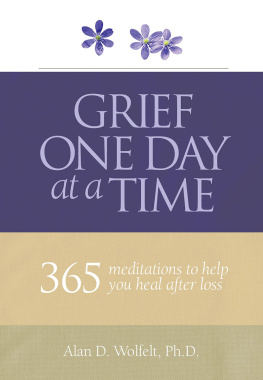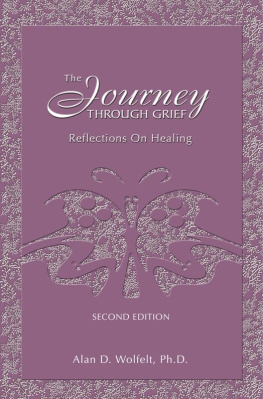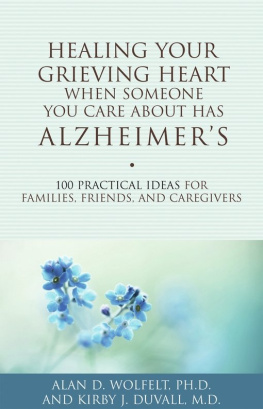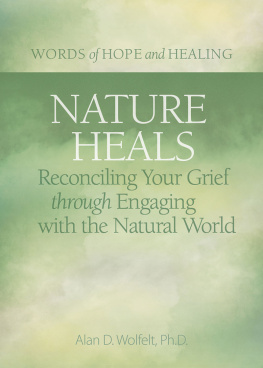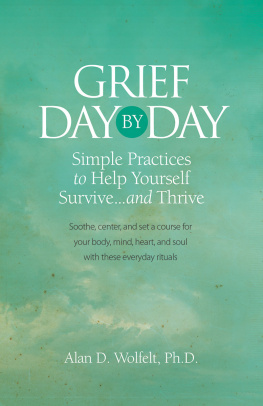
Also by Alan Wolfelt:
Healing Your Traumatized Heart:
100 Practical Ideas After Someone You
Love Dies a Sudden, Violent Death
Healing a Friends Grieving Heart:
100 Practical Ideas for Helping Someone
You Love Through Loss
Creating Meaningful Funeral Ceremonies:
A Guide for Families
Healing the Adult Childs Grieving Heart:
100 Practical Ideas After Your Parent Dies
The Journey Through Grief:
Reflections on Healing
Loving from the Outside In,
Mourning from the Inside Out
Understanding Your Grief:
Ten Essential Touchstones for Finding
Hope and Healing Your Heart
The Wilderness of Grief: Finding Your Way
Companion Press is dedicated to the education and support of both the bereaved and bereavement caregivers. We believe that those who companion the bereaved by walking with them as they journey in grief have a wondrous opportunity: to help others embrace and grow through griefand to lead fuller, more deeply-lived lives themselves because of this important ministry.

For a complete catalog and ordering information, visit:
Companion Press
The Center for Loss and Life Transition
3735 Broken Bow Road
Fort Collins, CO 80526
(970) 226-6050
www.centerforloss.com

2014 by Alan D. Wolfelt, Ph.D.
All rights reserved. No part of this publication may be reproduced, stored in a retrieval system, or transmitted in any form or by any means, electronic, mechanical, photocopying, recording or otherwise, without prior permission of the publisher.
Companion Press is an imprint of the
Center for Loss and Life Transition,
3735 Broken Bow Road, Fort Collins, Colorado 80526
970-226-6050
www.centerforloss.com
Companion Press books may be purchased in bulk for sales promotions, premiums or fundraisers. Please contact the publisher at the above address for more information.
Printed in the United States of America
18 17 16 15 14 5 4 3 2 1
ISBN: 978-1-61722-209-2
In Gratitude
A heartfelt thank you to funeral directors Chad Vice and James Beasley for inspiring me to write this book. I met with them shortly after the 2013 Moore, Oklahoma, tornado. As I attempted to honor the stories of love and loss they shared with me, I realized that a resource like this was needed to help families impacted by natural disasters.
C ONTENTS
INTRODUCTION
I live on the western edge of Fort Collins, Colorado, on the first foothill of the beautiful Rocky Mountains. To the east lies the jewel that is Fort Collins; to the west rise up ever-higher foothills and, in the distance, majestic mountain peaks.
I feel lucky to live in such a beautiful and sacred place. In recent years, there have also been several times when my family and I have felt anxious, afraid, and even traumatized. Raging, uncontrollable forest fires have come much too close for comfort. Twice we have been evacuated, forced to helplessly watch from afar as the hungry infernos indiscriminately devoured acre upon acre and home upon home. Fortunately for us, though the wildfires have come close, they have so far spared our home.
Unfortunately for us, a different kind of fireone caused by the incorrect installation of a hot water heatergutted our home in 2009. Smoke suddenly began rising from the area of our furnace room one early afternoon in December, and within minutes, much of our homes interior was engulfed in flames. Firefighters were able to save the exterior walls, but almost everything inside was a total loss. We had to move out and live in a succession of rental homes for a full year. Most of our belongings were either burned or destroyed by smoke damage. Though no one was injured, this was indeed a disastrous time for our family, and even recounting it today stirs up embers of trauma and loss.
So if you have experienced a natural disaster, I understand something of your pain. I have also been a grief counselor and educator for more than thirty years, and in that time the thousands of mourners I have companioned, the thousands of bereavement caregivers I have had the privilege to know, and my own personal experiences with grief and loss have taught me that no matter its specific cause, grief is a natural and necessary process after loss of any kind.
How common are natural disasters?
When you are personally touched by a local disaster or affected by a large-scale disaster (such as Hurricane Sandy), it can seem that natural disasters are happening everywhere, all the time. Indeed, they are ubiquitous.
According to Prevention Web (preventionweb.net), there were 640 natural disasters in the United States in the twenty-year period from 1980 to 2010. The vast majority of these392were storms (hurricanes and tornados), followed by floods, wildfires, earthquakes, and extreme temperatures. More than 12,000 people were killed. Nearly 27 million people were affected.
The United Nations International Strategy for Disaster Reduction says that more than 226 million people globally are affected by natural disasters each year. Earthquakes and droughts kill the most people, while floods and storms affect the most people.
At the time of this writing, recent natural disasters have included Super Typhoon Haiyan, which flattened the Philippines; a category 5 tornado that reduced Moore, Oklahoma, to rubble; and numerous wildfires in Colorado and California, to name just a few.
Of course, I dont provide these wide-scale statistics to diminish the importance of your very personal experience. No matter how common something is, when it happens to you, you experience the loss uniquely and intimately. That fact is foremost in my mind as I write this book. However, it may help you to realize that there are thousands and sometimes millions of others on planet Earth at any given time who understand your journey. Through the miracle of the internet, you can connect with them through online forums, websites, Facebook, and other social media. Reaching out to comfort and be comforted by others who have experienced a natural disaster similar to the one that affected you (or by the same natural disaster that affected you) will help all of you.
Yes, you are grieving
The purpose of this book is to help you understand, embrace, and heal from your many thoughts and feelings after a natural disaster. You see, even if your home, your belongings, and your loved ones were spared, if your life has been touched by a tornado, hurricane, flood, earthquake, fire, drought, or other natural disaster, you are experiencing grief. You might not think of what youre going through as grief because you might associate grief primarily with death, but whenever you experience loss, you grieve.
You have lost your sense of safety. You have lost trust in your surroundings and perhaps in your communitys emergency response systems. You may have lost community assets you treasured or relied on, such as roads, parks, bridges, shops, restaurants, etc. You are probably wrestling with why, philosophically speaking, natural disasters happen. You may have personally lost property and even human life.
Next page
